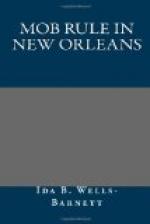The reporters of the New Orleans Picayune were no more successful than their brethren of the Times-Democrat. They, too, were compelled to substitute fiction for facts in their attempt to prove Charles a desperado. In the issue of the twenty-sixth of July it was said that Charles was well known in Vicksburg, and was there a consort of thieves. They mentioned that a man named Benson Blake was killed in 1894 or 1895, and that four Negroes were captured, and two escaped. Of the two escaped they claim that Charles was one. The four negroes who were captured were put in jail, and as usual, in the high state of civilization which characterizes Mississippi, the right of the person accused of crime to an indictment by legal process and a legal trial by jury was considered an useless formality if the accused happened to be black. A mob went to the jail that night, the four colored men were delivered to the mob, and all four were hanged in the court-house yard. The reporters evidently assumed that Charles was guilty, if, in fact, he was ever there, because the other four men were lynched. They did not consider it was a fact of any importance that Charles was never indicted. They called him a murderer on general principles.
+DIED IN SELF-DEFENSE+
The life, character and death of Robert Charles challenges the thoughtful consideration of all fair-minded people. In the frenzy of the moment, when nearly a dozen men lay dead, the victims of his unerring and death-dealing aim, it was natural for a prejudiced press and for citizens in private life to denounce him as a desperado and a murderer. But sea depths are not measured when the ocean rages, nor can absolute justice be determined while public opinion is lashed into fury. There must be calmness to insure correctness of judgment. The fury of the hour must abate before we can deal justly with any man or any cause.
That Charles was not a desperado is amply shown by the discussion in the preceding chapter. The darkest pictures which the reporters could paint of Charles were quoted freely, so that the public might find upon what grounds the press declared him to be a lawbreaker. Unquestionably the grounds are wholly insufficient. Not a line of evidence has been presented to prove that Charles was the fiend which the first reports of the New Orleans charge him to be.
Nothing more should be required to establish his good reputation, for the rule is universal that a reputation must be assumed to be good until it is proved bad. But that rule does not apply to the Negro, for as soon as he is suspected the public judgment immediately determines that he is guilty of whatever crime he stands charged. For this reason, as a matter of duty to the race, and the simple justice to the memory of Charles, an investigation has been made of the life and character of Charles before the fatal affray which led to his death.
Robert Charles was not an educated man. He was a student who faithfully investigated all the phases of oppression from which his race has suffered. That he was a student is amply shown by the Times-Democrat report of the twenty-fifth, which says:




